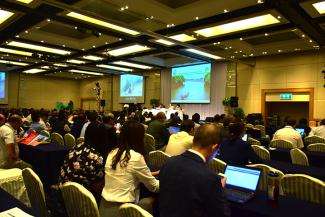The 6th IUCN Asia Regional Conservation Forum - one of Asia's most important events to tackle biodiversity and ecosystem conservation - kicked off in Bangkok, Thailand, 10 August 2015 with a strong focus on bringing together a wide diversity of sectors to forge solutions to the region's pressing environment and development challenges.
The forum is co-hosted by the Ministry of Natural Resources and Environment (MONRE), Government of Thailand and IUCN (International Union for Conservation of Nature) through the National Committee of IUCN Members in Thailand.
More than 300 delegates from governments, NGOs, research and academic institutions and the private sector from 26 countries in South, East and Southeast Asia and beyond are participating in the event which happens once every four years.
“The Kingdom of Thailand is proud to host this event as an expression of our nation's commitment to biodiversity conservation and environmental sustainability,†said MONRE Minister H.E. General Dawpong Ratanasuwan. “Economic growth and nature conservation must go hand in hand if we are to secure the future and build the resilience not just of Thailand, but of Asia as a whole,†he added.
Asia is one of the world's most dynamic regions, accounting for 40% of global economic output and 2/3 of global growth. At the same time 60% of the world's population call Asia home, but 800 million live below the poverty line. Meanwhile, urban populations are predicted to grow from 1.9 billion to 3.3 billion in 2050.(1)
The fast pace of development is taking a toll on the region's species and ecosystems. Asia is known for its rich natural diversity, hosting five of the world's 17 mega-diverse countries. But this biodiversity is in crisis. Loss of mangrove cover and the rate of loss of wetlands are the highest in the world, and 95% of Southeast Asia's coral reefs are at risk. Ten countries in Asia are experiencing high or very high water stress and more than 1,400 plants and animals are listed as Critically Endangered.(2)
At the centre of the crisis are the hundreds of millions of people who rely, directly or indirectly, on nature for food and livelihood, and those who live in vulnerable areas that are predicted to be hardest hit by climate change and disasters.
“The challenges Asia faces today present an opportunity to build bridges between global and local action towards sustainable development,†said IUCN President Zhang Xinsheng. “Human, social and economic well-being - the keys to resilience of societies - depend on the health of natural ecosystems. We need to act now to protect nature, we need to innovate to rediscover the solutions already provided by nature, and we need to work together across all sectors to make these solutions happen,†he added.
The forum, ongoing at the Royal Orchid Sheraton until 12 August, provides a platform for leaders from all sectors of society to discuss nature-based solutions to environmental, economic, and social challenges in Asia. Under the theme of “Resilience in action: creating solutions for people and nature,†the forum will address themes such valuing and conserving nature, effective and equitable governance of nature's use and deploying nature-based solutions to address societal challenges. A variety of side events on a broad range of topics will also be held from 10-11 August. Visit www.iucn.org/rcf2015 for more details
Source : http://www.iucn.org




